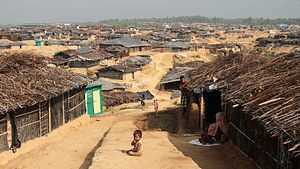On September 28, China delivered 150 tons of aid, including 2,000 relief tents and 3,000 blankets, to Rohingya refugees in Bangladesh. The Chinese foreign ministry, however, was careful with the wording in its statements in relation to the delivery, making no mention of the “Rohingya” at all. Meanwhile, China, along with with Russia, supported Myanmar at the U.N. Security Council’s first open meeting on the Rohingya issue.
The Chinese embassy in Bangladesh first released information on September 28 that China donated aid to “refugees who have poured into Bangladesh recently.” Li Guangjun, Chinese commercial counselor to Bangladesh, said that China “sympathized with the refugees in Bangladesh” and “appreciated the humanitarian assistance provided by Bangladesh.” He added, China donated the 150 tons of aid, “hoping to improve the refugees’ lives.” In response, the representative of Bangladesh thanked China and hoped that China, as “Bangladesh’s good old friend,” could continue to provide support and aid.
Although the Chinese embassy in Bangladesh didn’t use the word “Rohingya” — a term the Myanmar government refuses to use — directly, the supplies were destined for Bangladesh’s southeastern region, Chittagong, where the Rohingya refugees are concentrated.
Notably, Chinese foreign ministry spokesperson Lu Kang confirmed China’s aid to Bangladesh on September 30, but slightly changed the wording: rather than calling the Rohingya refugees, Lu referred to them as “displaced people.” He said:
The Chinese side is highly concerned about the difficulty facing Bangladesh in resettling the displaced people in the Myanmar-Bangladesh border area. In order to help the government of Bangladesh with the resettlement efforts, the Chinese government has decided to provide emergency humanitarian supplies to the government of Bangladesh…the Chinese side supports Bangladesh’s efforts to resettle the displaced people properly and stands ready to continue providing assistance to Bangladesh as its capacity allows.
Chinese officials avoiding the term “Rohingya” is in line with Beijing’s continued support of the Myanmar government.
On September 28, the United Nations Security Council held the first open meeting on the Rohingya crisis in Myanmar. Noting that about 500,000 Rohingya have fled Myanmar and sought refuge in Bangladesh, the Secretary-General António Guterres said “The situation has spiralled into the world’s fastest developing refugee emergency and a humanitarian and human rights nightmare.”
While the United States, Britain and France demanded an end to the violence in Myanmar, China and Russia expressed sympathy toward Myanmar’s government. The Associated Press reported that China’s Deputy UN Ambassador Wu Haitao called upon the international community “to view the difficulties and challenges confronting the government of Myanmar through objective optics, exercise patience, and provide support and help.” Wu added that “All parties should work constructively to help reinforce this momentum, de-escalate the situation and alleviate the humanitarian conditions step-by-step.”
Hu Zhiyong, an associate researcher at the Shanghai Academy of Social Sciences explained China’s policy to the South China Morning Post: “China will maintain its non-interference policy but will also be proactive [in trying] to mediate in the Rohingya issue.”
































